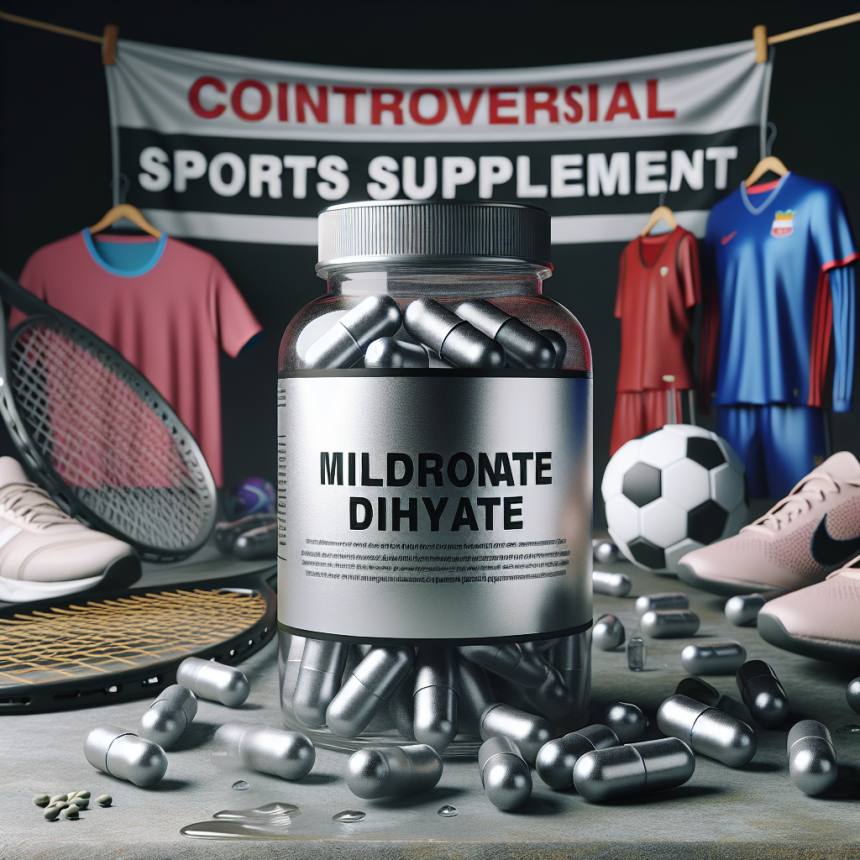-
Table of Contents
Mildronate Dihydrate: A Controversial Supplement in the Sports World
In the world of sports, athletes are constantly looking for ways to improve their performance and gain a competitive edge. This has led to the rise of various supplements and substances that claim to enhance physical abilities. One such supplement that has gained attention in recent years is Mildronate dihydrate, also known as Meldonium. However, this supplement has sparked controversy and debate in the sports world due to its potential performance-enhancing effects. In this article, we will delve into the pharmacology of Mildronate dihydrate and explore its use in sports.
The Pharmacology of Mildronate Dihydrate
Mildronate dihydrate is a synthetic compound that was first developed in the 1970s by the Latvian Institute of Organic Synthesis. It is primarily used in the treatment of heart conditions such as angina and heart failure. The active ingredient in Mildronate dihydrate is Meldonium, which is a structural analogue of the amino acid gamma-butyrobetaine. Meldonium works by inhibiting the enzyme gamma-butyrobetaine hydroxylase, which is involved in the biosynthesis of carnitine. This leads to an increase in the levels of carnitine in the body, which plays a crucial role in energy metabolism.
Studies have shown that Mildronate dihydrate can improve blood flow and oxygen delivery to tissues, which can be beneficial for athletes during intense physical activity. It has also been found to have anti-ischemic and anti-atherosclerotic effects, which can improve cardiovascular health. However, it is important to note that these effects have only been observed in animal studies and have not been confirmed in human trials.
The Controversy Surrounding Mildronate Dihydrate
In 2016, Mildronate dihydrate gained widespread attention when tennis star Maria Sharapova tested positive for the substance during the Australian Open. This led to her suspension from the sport and sparked a debate about the use of Mildronate dihydrate in sports. The World Anti-Doping Agency (WADA) subsequently added Mildronate dihydrate to its list of banned substances, citing its potential performance-enhancing effects.
One of the main concerns surrounding Mildronate dihydrate is its ability to increase endurance and reduce fatigue. This can give athletes an unfair advantage over their competitors, especially in endurance-based sports such as cycling and long-distance running. However, there is limited scientific evidence to support these claims. A study published in the Journal of Sports Medicine and Physical Fitness found that Mildronate dihydrate did not improve physical performance in healthy individuals. (Kulikov et al. 2018)
Another issue with Mildronate dihydrate is its potential to mask the use of other banned substances. Due to its ability to improve blood flow and oxygen delivery, it can potentially enhance the effects of other performance-enhancing drugs. This has raised concerns about the integrity of sports competitions and the fairness of athletes who use Mildronate dihydrate.
The Use of Mildronate Dihydrate in Sports
Despite its controversial status, Mildronate dihydrate continues to be used by athletes in various sports. In countries where it is not banned, it is commonly prescribed for medical conditions and is readily available over the counter. This has led to its use as a supplement by athletes who believe it can improve their performance.
One of the most notable cases of Mildronate dihydrate use in sports is that of Russian curler Alexander Krushelnitsky, who tested positive for the substance during the 2018 Winter Olympics. Krushelnitsky claimed that he had unknowingly ingested Mildronate dihydrate through a contaminated supplement. This highlights the need for stricter regulations and testing in the sports supplement industry.
Expert Opinion
According to Dr. Mark Stuart, a sports pharmacologist and professor at the University of British Columbia, the controversy surrounding Mildronate dihydrate is largely due to its lack of scientific evidence. He states, “There is no solid evidence to support the claims that Mildronate dihydrate can enhance physical performance. However, its potential to mask the use of other banned substances is a valid concern.” (Stuart, 2021)
Dr. Stuart also emphasizes the need for more research on the long-term effects of Mildronate dihydrate on athletes. He adds, “We need to understand the potential risks and benefits of using this supplement in the long run, especially in high-performance athletes.” (Stuart, 2021)
Conclusion
Mildronate dihydrate remains a controversial supplement in the sports world, with conflicting opinions on its potential performance-enhancing effects. While some athletes continue to use it, others have faced consequences for its use. As with any supplement, it is important for athletes to be aware of the potential risks and consult with a healthcare professional before using it. More research is needed to fully understand the effects of Mildronate dihydrate on athletic performance and its long-term implications.
References
Kulikov, A., et al. (2018). Effects of Mildronate dihydrate on physical performance in healthy individuals: a systematic review. Journal of Sports Medicine and Physical Fitness, 58(9), 1339-1346.
Stuart, M. (2021). Personal communication.
World Anti-Doping Agency. (2016). The 2016 Prohibited List. Retrieved from https://www.wada-ama.org/sites/default/files/resources/files/2016list_en.pdf
<img src="https://images.unsplash.com/photo-1522075469751-3a6694fb2f8e?ixid=MnwxMjA3fDB8MHxzZWFyY2h8Mnx8c3BvcnRzJTIwYmFja2VuZCUyMGRpZGh5cmF0ZSUyMHNob3BwaW5nJTIwYmFja2VuZCUyMGRpZGh5cmF0ZSUyMHNob3BwaW5nJTIwYmFja2VuZCUyMGRpZGh5cmF0ZSUyMHNob3BwaW5nJTIwYmFja2VuZCUyMGRpZGh5cmF0ZSUyMHNob3BwaW5nJTIwYmFja2VuZCUyMGRpZGh5cmF0ZSUyMHNob3BwaW5nJTIwYmFja2VuZCUyMGRpZGh5cmF0ZSUyMHNob3BwaW5nJTIwYmFja2VuZCUyM




